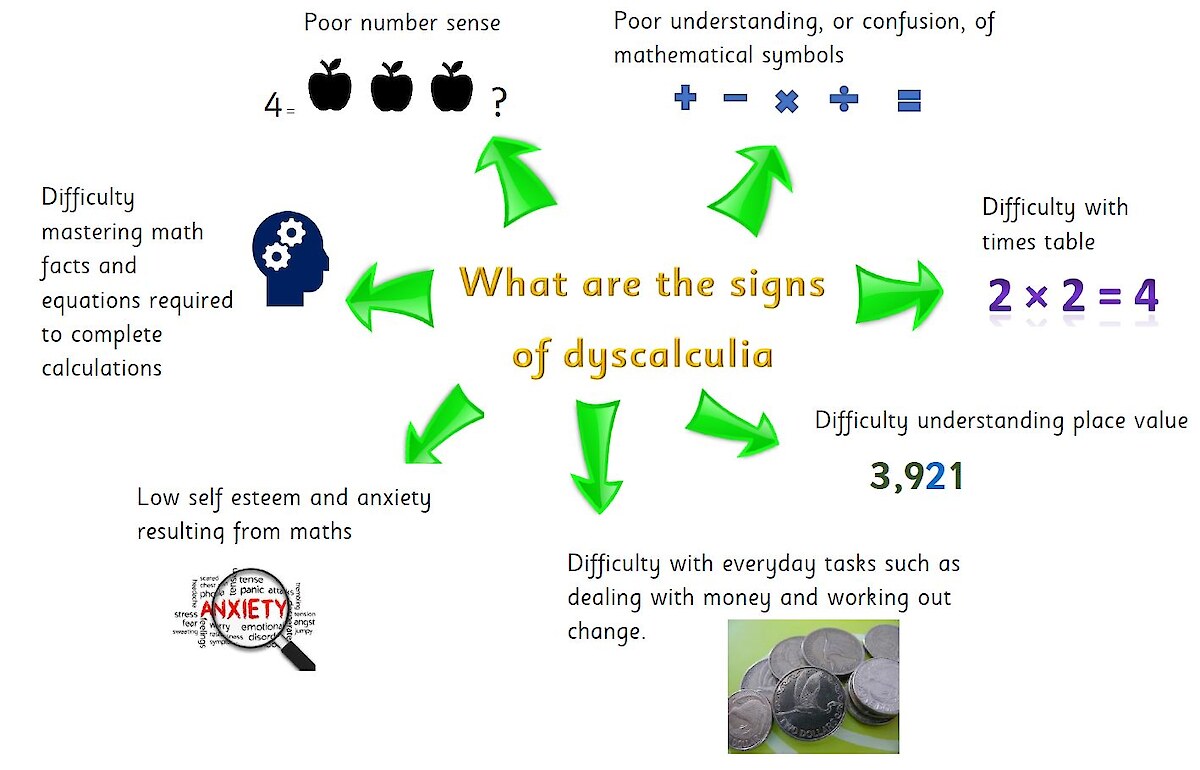Dyscalculia
Dyscalculia is a brain-based learning difference that makes it difficult to understand numbers and mathematical concepts. It is characterised by severe difficulty in math, irrespective of an individual’s intelligence.
This condition impacts a person’s ability to:
- Learn multiplication tables.
- Perform subtraction.
- Compare numbers.
- Remember steps in calculations and complete tasks efficiently.
- Understanding time.
Dyscalculia affects approximately 6% of the population and can co-occur with other learning differences, such as dyslexia (in about 50% of cases).
Math Challenges and Dyslexia
Even without dyscalculia, individuals with dyslexia may struggle with math, particularly when:
- Solving word problems that require strong reading skills.
- Using short-term memory to recall steps in calculations.
Signs of dyscalculia

How is Dyscalculia Assessed?
One option is through an assessment with SPELD NZ . Specifically mention you are wanting a dyscalculia assessment when booking.
A few schools have dyscalculia screeners they use. Ask your school’s Special Education Needs Co-ordinator for information on this.
What Can I Do at Home to Help?
Math anxiety is a common result of dyscalculia. Supporting your child at home and working with their teacher can make a significant difference.
- Collaborate with Teachers: Inform the teacher of your child’s learning difficulty so they can use classroom accommodations, such as:
- Providing extra time for tasks.
- Giving written examples of completed problems as references.
- Incorporate Math into Daily Life:
- Use everyday activities, like handling money, calculating portions during meals, or comparing quantities.
- Play card games or board games that involve numbers to make learning fun.
Software Options for Home Use
Free software specifically designed for dyscalculia can provide additional support:
- The Number Race: Suitable for children aged 4–8.
- The Number Catcher: Designed for ages 5–10 but also benefits older children and adults.
Further Resources
For more information, visit Understood.org or contact [Enable JavaScript to view protected content] for guidance and support tailored to Southland.
Summary on Maths Anxiety and Dyscalculia from workshop by Sarah Bartley
Attitudes to Maths
Sarah started by showing us a variety of videos and we were asked to discuss what we noticed about attitudes to maths.
The videos portrayed the following were needed to be good at maths:
- A boy
- Exceptional talent
- Foreign
- Elite
- A nerd
You will commonly hear comments such as “I’m no good at maths”. We have become accustomed to saying and believing it’s okay not to be good at maths. You do not hear people say “I’m no good at reading”.
Dyscalculia definition
People with dyscalculia will:
- Have difficulty subitising. This is the ability to instantaneously recognise the number of objects in a small group without the need to count them. They can do this but it will take them longer.
- Struggle with number sense. This is knowing that the number 5 represents a quantity of five, for example, five apples.
It can co-exist with dyslexia. Dyslexia can impact on the ability of maths when there is a reading component, a demand on short term memory, or a demand on the ability to sequence the maths info.
Maths anxiety
Sarah had completed a study in 2016 on maths anxiety and found the following factors that help to create maths anxiety include:
- parental attitude, if the parent says “I hate maths” or “I’m no good at maths” this is reflected in the student.
- Overcrowded curriculum, particularly in high school
- Maths anxiety is passed from adult to child
- Time taken out of maths class for extra support with literacy.
There is usually a trigger event to start maths anxiety and the child will usually be able to vividly remember what it was.
Strategies for at home and school
It’s important for the student to know they can retrain their brain. (This is called Growth Mindset)
Strategies include;
- Teach them how knowing 6 x 8 is the same as 8 x 6 (commutativity) to reduce the load of what they have to learn.
- Explicitly teach the language of maths, for example, takeaway and minus both represent this symbol -
- Use concrete (blocks, fruit etc) examples to help them grasp the concepts. Include it in everyday life as much as possible as they need to see it as much as possible.
- Relate it to real life.
Be aware of online maths training programmes as they can be literacy dense, meaning there is a lot of reading and this can be restrictive.
Most importantly: Be positive about your ability to have a go at maths.

